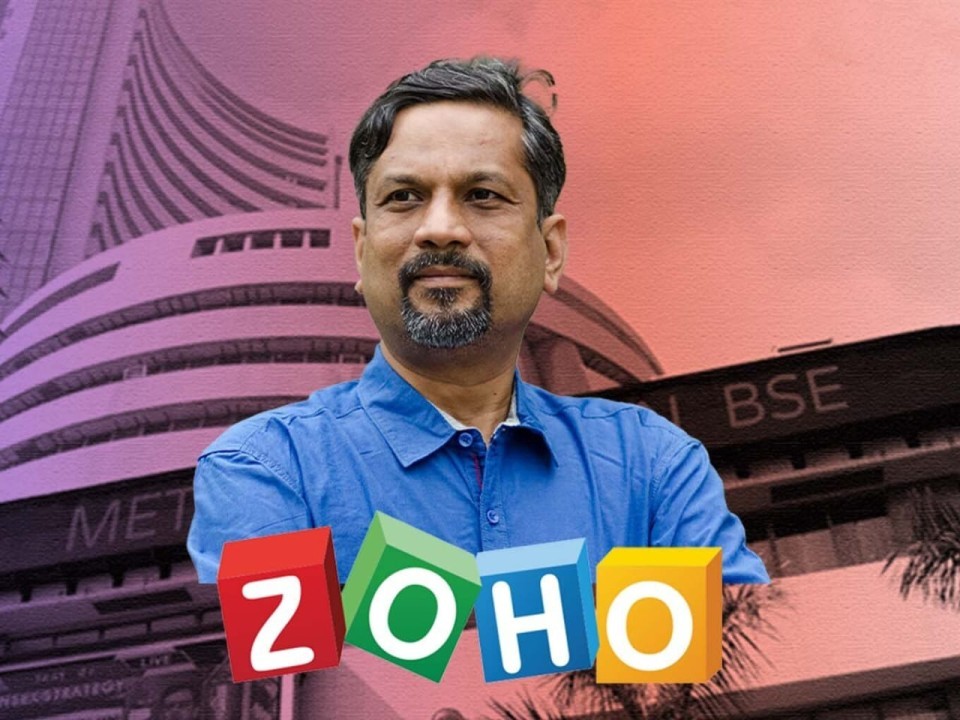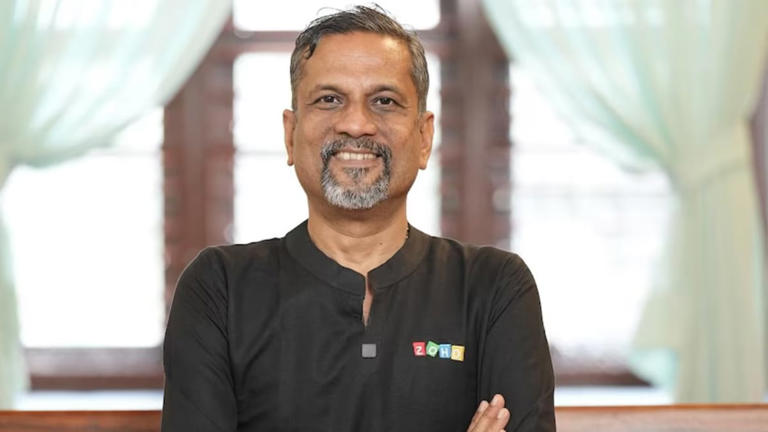
Sridhar Vembu Success Story: Zoho Founder and Creator of Arattai, a Made-in-India Messaging App
Introduction
In recent years, India has witnessed a growing movement towards self-reliance in technology. From digital payment systems to social media platforms, Indian entrepreneurs are stepping up to create world-class solutions that reduce dependence on foreign apps. One such visionary is Sridhar Vembu, the founder of Zoho Corporation, a globally recognized software company.

While Zoho has been empowering businesses worldwide with its cloud-based tools, Vembu took another bold step by introducing Arattai, a homegrown messaging app positioned as an alternative to WhatsApp. With concerns around data privacy and digital sovereignty on the rise, Arattai brings a refreshing “Made-in-India” approach to personal and professional communication.
This article explores Sridhar Vembu’s journey, the inspiration behind Arattai, and the potential benefits such platforms hold for India.
Who is Sridhar Vembu?
Sridhar Vembu is an Indian entrepreneur best known for co-founding Zoho Corporation in 1996. Born in Tamil Nadu, he graduated with a degree in Electrical Engineering from IIT Madras and later pursued his Ph.D. at Princeton University. Despite his academic achievements and opportunities abroad, Vembu chose to return to India to build something of his own.

Unlike many tech founders who relocate to Silicon Valley, Vembu is deeply rooted in his belief that India has the talent and capability to build world-class products. In fact, he operates much of Zoho’s business from rural Tamil Nadu, employing and training local youth, proving that innovation is not limited to metropolitan cities.
His philosophy emphasizes:
- Self-reliance in technology
- Rural empowerment through job creation
- Long-term sustainable growth over short-term profits
This mindset not only shaped Zoho into a successful global enterprise but also laid the foundation for Arattai.
Zoho Corporation: A Global Success with Indian Roots
Before diving into Arattai, it’s important to understand the legacy of Zoho.
- Founded in 1996 as AdventNet, Zoho initially provided network management software.
- Over the years, it evolved into a cloud-based SaaS company offering more than 50 productivity and business applications.
- Today, Zoho competes with global giants like Microsoft and Google by offering tools such as Zoho Mail, Zoho CRM, Zoho Books, and more.
- Headquartered in Chennai and Austin, Texas, Zoho serves over 100 million users worldwide.
Zoho’s success proved that Indian companies could build global products without external funding. Sridhar Vembu intentionally avoided venture capital, ensuring Zoho’s independence and long-term stability.
This independence and focus on Indian talent naturally extended into his next innovation: Arattai.
What is Arattai?
Arattai, which means “chat” in Tamil, is a made-in-India messaging app developed by Zoho Corporation. Launched quietly in early 2021, the app was designed as a secure, fast, and reliable alternative to WhatsApp.
Some of its features include:
- One-on-one messaging
- Group chats
- High-quality voice and video calls
- File sharing
- End-to-end encryption for enhanced privacy
- No ads, no data selling — unlike many global apps that monetize user data
Arattai was born during a time when WhatsApp faced criticism in India over its updated privacy policies. Millions of users were concerned about data being shared with Facebook, which created a demand for local, secure alternatives.
By leveraging Zoho’s technological expertise, Arattai positioned itself as a trustworthy Indian option for those seeking privacy without compromising on features.
Why India Needs Apps Like Arattai
1. Data Privacy and Security
One of the biggest concerns around global apps is how they handle user data. With incidents of surveillance and data leaks becoming common, having an Indian app like Arattai ensures that user information remains within the country’s jurisdiction and protected by local laws.
2. Digital Sovereignty
Dependence on foreign platforms means relying on other nations’ policies and interests. With apps like Arattai, India strengthens its digital sovereignty, ensuring that its citizens are not solely dependent on external players.
3. Boost to Atmanirbhar Bharat (Self-Reliant India)
The launch of Arattai aligns with the Indian government’s Atmanirbhar Bharat initiative, which encourages the development and adoption of indigenous technologies. Supporting homegrown apps helps strengthen the national economy and reduce reliance on imports.
4. Job Creation in Rural India
Sridhar Vembu has always emphasized rural development. By building Zoho and Arattai in smaller towns and villages, he creates local employment opportunities, reduces migration to cities, and empowers communities with technology-driven jobs.
5. Competitive Innovation
Global monopolies often lead to limited innovation. With Indian alternatives emerging, healthy competition forces all players to improve their features, security, and pricing.
Challenges Arattai Faces
While Arattai is a promising app, it faces challenges in establishing itself against giants like WhatsApp, Signal, and Telegram.
- User Base: WhatsApp already has over 500 million users in India, making it difficult for new apps to compete.
- Network Effect: People prefer platforms where their friends and family are already active. Convincing users to switch is challenging.
- Continuous Development: Competing with global players requires ongoing investment in technology, security, and user experience.
Despite these challenges, Arattai has an advantage: trust in Sridhar Vembu and Zoho’s reputation for ethical, long-term business practices.
Sridhar Vembu’s Vision for India
What makes Sridhar Vembu stand out is not just his entrepreneurial success, but his vision for India’s technological independence. He believes India should not just be a consumer of global apps but also a producer of world-class solutions.

Some of his guiding principles include:
- Investing in talent within rural India instead of outsourcing everything to cities or abroad.
- Avoiding external funding to keep companies free from external pressures.
- Focusing on product excellence rather than aggressive marketing.
- Encouraging local adoption of homegrown tools like Arattai.
This vision not only benefits India’s digital future but also inspires young entrepreneurs to think beyond quick profits and focus on long-term nation-building.
Benefits of Arattai to India
To summarize, here’s how Arattai contributes to India’s growth:
- Data security – Keeps user data safe under Indian jurisdiction.
- Economic growth – Supports Indian IT companies and generates local revenue.
- Job creation – Provides employment opportunities in semi-urban and rural areas.
- Encourages innovation – Sparks development of more indigenous platforms.
- Cultural pride – Promotes the use of Indian apps globally, highlighting India’s software capabilities.
Future of Arattai and Indian Messaging Apps
While it’s too early to predict whether Arattai can dethrone WhatsApp, its existence is a step in the right direction. The increasing awareness around data privacy and the growing adoption of Indian digital tools could work in its favor.
Additionally, with India being one of the largest smartphone markets in the world, even a small share of the messaging market can turn into millions of active users for Arattai.
If Sridhar Vembu continues to integrate Arattai with Zoho’s ecosystem of apps, it could also gain traction among businesses looking for secure communication tools.
Conclusion
Sridhar Vembu’s journey from a small town in Tamil Nadu to building global software products is truly inspirational. With Arattai, he once again demonstrates that India can create world-class alternatives to global tech giants.
While Arattai may not yet have the massive user base of WhatsApp, its existence signifies a broader movement — India’s shift towards technological self-reliance. As more people recognize the importance of supporting indigenous innovations, platforms like Arattai will play a key role in shaping the nation’s digital future.
By empowering local talent, safeguarding data privacy, and promoting Atmanirbhar Bharat, Sridhar Vembu is not just building an app — he’s building a vision for a stronger, self-reliant India.
📌 Suggested FAQ Section (for SEO + Readers)
1. Who is Sridhar Vembu?
Sridhar Vembu is the co-founder of Zoho Corporation, a global SaaS company. He is also the visionary behind Arattai, a made-in-India messaging app.
2. What is the Arattai app?
Arattai is a secure messaging platform developed by Zoho Corporation. It offers messaging, voice calls, video calls, file sharing, and end-to-end encryption, making it a homegrown alternative to WhatsApp.
3. Why is Arattai important for India?
Arattai promotes data privacy, digital sovereignty, and self-reliance under the Atmanirbhar Bharat initiative. It also creates jobs in rural India and strengthens the local tech ecosystem.
4. How is Arattai different from WhatsApp?
Unlike WhatsApp, Arattai is ad-free, does not sell user data, and is fully developed in India. It ensures users have control over their information while offering similar communication features.
5. Can Arattai replace WhatsApp in India?
While WhatsApp has a larger user base, Arattai is gaining attention as a trustworthy and privacy-focused alternative. With India’s growing demand for local apps, Arattai has strong potential.
6. What are the benefits of supporting Indian apps like Arattai?
Supporting Indian apps boosts the local economy, creates jobs, protects user data, and strengthens India’s position as a global technology leader.
For the Latest Jobs Notifications: Click Here
Join With Us On WhatsApp: Click Here
Join With Us On LinkedIn: Click Here
Free Python Learning: Click Here